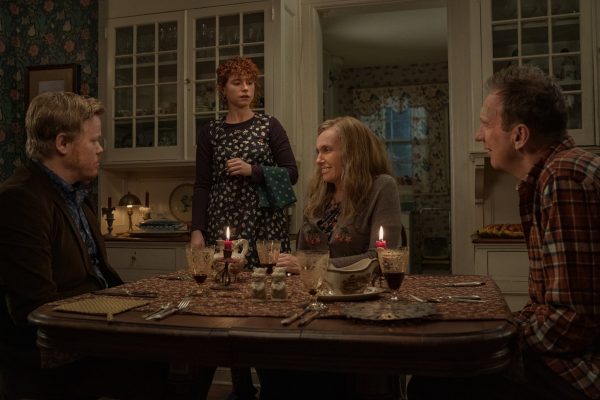Film Review: “I’m Thinking of Ending Things” — Charlie Kaufman’s Hall of Existential Mirrors Glimmers Darkly
By Isaac Feldberg
I’m Thinking of Ending Things is a bit of a wonder, a careful nightmare that demands rapt attention even if repeated viewings do little to assuage its eeriness.

(l to r) Jesse Plemons, Jessie Buckley, Toni Collette, and David Thewlis in a scene from I’m Thinking of Ending Things.
Charlie Kaufman’s overarching aim as a writer and director, if we were to simplify the oeuvre of one of this era’s most ceaselessly innovative filmmakers to a single compulsion (not advisable, for obvious reasons), has been to capture in simulacra the pangs and peculiarities of the human mind.
Whether through the elaborate synaptic slipstream of Synecdoche, New York, the disconcerting felted unreality of Anomalisa, or any of the ecstatic, elastic contraptions that power his scripts for Being John Malkovich, Adaptation, and Eternal Sunshine of the Spotless Mind, Kaufman busies himself with replicating our intricate internal processes. He’s tended to do so through explicitly external environments — staging examinations of self as surreal plays-within-plays or directly cranial excavations — and that complexity has led some to dismiss Kaufman as postmodern and/or pretentious. I understand both criticisms, but there’s a desperate, romantic sincerity to his work all the same, a desire for earnest expression in defiance of a smug and capricious world. Heady and labyrinthine, Kaufman’s films could be dismissed as impassive existential vacuums, were it not for the genuine compassion behind each enterprise. They resonate most because the director seems to be grappling with what appears to him the only subject worth the effort.
His latest, I’m Thinking of Ending Things (streaming next Friday on Netflix), opens as a young woman, Lucy (Jessie Buckley), accompanies her boyfriend, Jake (Jesse Plemons), on a road trip to his parents’ farm in the countryside. It’s snowy out, but the air between them carries another chill. Lucy – who’s sharp, curious, and overly accommodating, with a shock of red hair – is contemplating breaking things off. It’s not that Jake’s necessarily a bad boyfriend, but he’s odd company: aloof, impatient, and slow in a way that suggests something else working behind the eyes. He seems aware of her indecision, resentful of it. Their conversations, about poetry and musical theater and why the rotting shell of a house they just passed might’ve had a new swing set out front, are halting and adversarial. Neither wear seatbelts.
Once they reach the farmhouse, Lucy sniffs out a faint air of death around the place. From the upstairs window, Jake’s mother (Toni Collette) keeps waving as if she’s incapable of stopping. Jake shows her a blackened area in the barn where his father (David Thewlis) checked on two sows that seemed sedentary; he turned them over only to find maggots eating both alive. At dinner, Jake’s parents are like that, too. There’s something gnawing at their innards. Grinning widely and chattering in delight as Lucy starts to tell the story of how she and Jake met, they can’t help but resemble automatons wound too tight, stuttering badly, shrieking until their laughs become sobs. If this all sounds remarkably frightening, it is, especially given the arresting veracity Thewlis and Collette bring to these impossible characters. And Kaufman keeps reeling you in with abrupt cuts and narrative feints that worm their way ahead, until you’re forced to pick at the scabs to see what he’s slid underneath.

Jessie Buckley in I’m Thinking of Ending Things.
Note the wallpaper in Jake’s house, flower-patterned and lightly spoiled. The film opens with a mesmerizing slow-burn montage that evokes the designs of Victorian-era textile artist William Morris, also a poet, a novelist, and a socialist who said one should have nothing in their home except things they know to be useful or believe to be beautiful. Later, Lucy mentions Andrew Wyeth’s famed painting “Christina’s World,” which depicts a girl in a field, staring longingly in the direction of a farmhouse she knows she can’t reach. Jake paints, too, in the basement, where he doesn’t want Lucy to go. There, he’s recreated the eerily remote landscapes of painter Ralph Albert Blakelock, who lost his mind to schizophrenic delusions. It wouldn’t be Kaufman if every detail wasn’t meticulously placed. I’m Thinking of Ending Things is a bit of a wonder like that, a careful nightmare that demands rapt attention even if repeated viewings do little to assuage its eeriness.
The film – which, true to form for Kaufman, feels longer than its 134 minutes – grows more visually bold and conceptually acrobatic in its second half. This reflects the director’s idea that what makes something a horror-thriller (of which he says this is his first) should be as much about the way the narrative is presented as it is about its innate, diabolical slipperiness. Aesthetically, Kaufman’s never been in better company. Cold War cinematographer Łukasz Żal makes the leap from black-and-white to color while preserving something insidiously Gothic and slithering about Jake’s family home; his more quietly brilliant lensing of some scenes, such as when Jake and Lucy drive down snowy roads, establish the sense they’re on a kind of precipice, only a thin sheet of glass preventing them from being pulled into the polar vortex. The film’s hauntingly gorgeous score, by Jay Wadley, is similarly rich with stirrings of loss and longing. Both cinematographer and composer are set free to play in the warped high-wire-act finale with almost fanatical glee: it is set somewhere unexpected and complicates the film’s multitudinous possible readings. This is an elusive treatise on loneliness and identity, a paean to the mirthless punchline of loving someone else in a world where all that can be known is the self. The finale opens a grimoire of soul-sickening regret.
But even before Kaufman delivers a gracefully deranged showstopper with the help of an all-in Plemons, the actor’s early scenes in the car are disorienting, perversely uncomfortable — they tell us more than we realize. He, like Buckley, is truly exceptional here, preserving flickers of tortured pathos within a character who’s constantly shape-shifting. As with any Kaufman film, the first viewing of I’m Thinking of Ending Things suggests the summoning of something monstrous and gangly. Upon a second viewing, this particular story’s inexorability can be more easily glimpsed in the tensed smiles of its characters, the beating of windshield wipers back and forth, steady as a metronome. But Kaufman’s spiked the script with so many hidden meanings, philosophical Easter eggs, and bristling textures that it openly invites a return stay.
Kaufman’s films travel winding roads to a shared destination. I’m Thinking of Ending Things is only more direct about this to spring intricate traps en route. Expulsions of weariness and sorrow, the director’s work ultimately intellectualizes the human experience for the sake of explicating what is inexplicable: to untangle the Gordian knot at the core of our existence, to build from that mess of flesh and theory a clockwork orange. Kaufman is aware this is hubris, but what’s the alternative for anyone wired to claw so insistently inward? For all their psychotic inclinations and nestled mnemonic devices, his stories can all be understood as myths: of men trapped in a self-reflecting labyrinth, resolved to slay the beast at its center, convinced down is the only way through, assured that at the end of their quest awaits a sought-after Real. Lucy keeps receiving voicemails on her phone, left by an unknown caller. “There’s only one question to answer,” the caller intones shakily, steeling himself. “The assumptions are right. I can feel my fear growing. Now is the time for the answer. Just one question. One question to answer.”
The phrase is “descending” into madness for a reason, and we have further to fall than we know. Kaufman is cunning in his depictions of psychosis. For him, it is a hero’s journey, that concludes not with an outer dimension revealed but a mind marooned. The most renowned literary practitioners of cosmicism, from Lovecraft to Ligotti, describe the known world as a thin scrim, obscuring vast and immeasurable horrors. Those who dare to look beyond that surface will see only their own madness mirrored back at them.
Thus the futility of trying to make sense of these tightly esoteric narratives, tracing Kaufman’s impenetrably strange loops from one end to another. It’s a paradoxical process, parsing Möbius scripts with moribund containers for keys that can magically unlock the meaning their design refutes. The more doors you fling open and compartments you free your mind to riffle through, the more you become embarrassingly conscious that his films work like trick mirrors. You are not digging into his gray matter, but your own. To repurpose David Foster Wallace, as Kaufman does, the idea is that eventually you end up becoming yourself. Kaufman tells stories about crippling insularity, about the self as the origin and endpoint of all we experience. We listen. He’s convincing.
It is curious given all this to see Kaufman adapting a preexisting work – from first-time novelist Iain Reid – for what’s only his third time at bat as a director after Synecdoche and Anomalisa. Of course, the latter claimed to be based on a play by one Francis Fregoli, but that’s merely another meta-fictional flourish on Kaufman’s part. The Fregoli Delusion in that film — that one can be deluded to believe that everyone you see is one person changing or disguising their appearance — is pertinent to I’m Thinking of Ending Things, as are to a lesser degree Capgras and Cotard’s (Kaufman’s favored psychiatric playthings in Synecdoche). I read the new film as a thesis on the strain of solipsism that can consume us melancholic types, how we can spiral down into a trap of depressive realism from which we can envision no escape – mainly because we built the trap for ourselves and didn’t outfit it with a door. Suicidal urges, depression, melancholia – these are mirrors, too, reflecting inner neuroses and realities that can start to feel all-consuming if we don’t look away in time.
This is a different story than the one Reid wrote, stranger and more darkly extravagant, pursuing a similar story but to its own ends. Still, there’s enough overlap to suggest some growth on Kaufman’s part, a willingness to contend with kindred spirits. I’m Thinking of Ending Things is, like Synecdoche, a brutal essay on the perils of overthinking your life and, like Anomalisa, a gorgeous meditation on what might be required, emotionally, to do something more meaningful with it.
The film is also horror that gets in the marrow, populated by wraiths of hunger and loss, holes in the fabric we can’t unsee. The darkness of I’m Thinking of Ending Things is a car in the garage with its exhaust blocked, humming along as it spews poisoned air. It doesn’t care if you get out, but it’s up to you whether you do. For its part, the film is an infernal device, a hall of mirrors long-since fractured, and a chilling evocation of the silence we’re left to ponder when asked if our impact on this place has been a remotely positive one. It’s just one question, sure, but if the whole world’s a haunted house and we’re merely ghosts passing through, it might be best not to answer.
Isaac Feldberg is an entertainment journalist currently based in Boston. Though often preoccupied by his ongoing quest to prove that Baby Driver is a Drive prequel, he always finds time to appreciate the finer things in life, like Michael Shannon.
